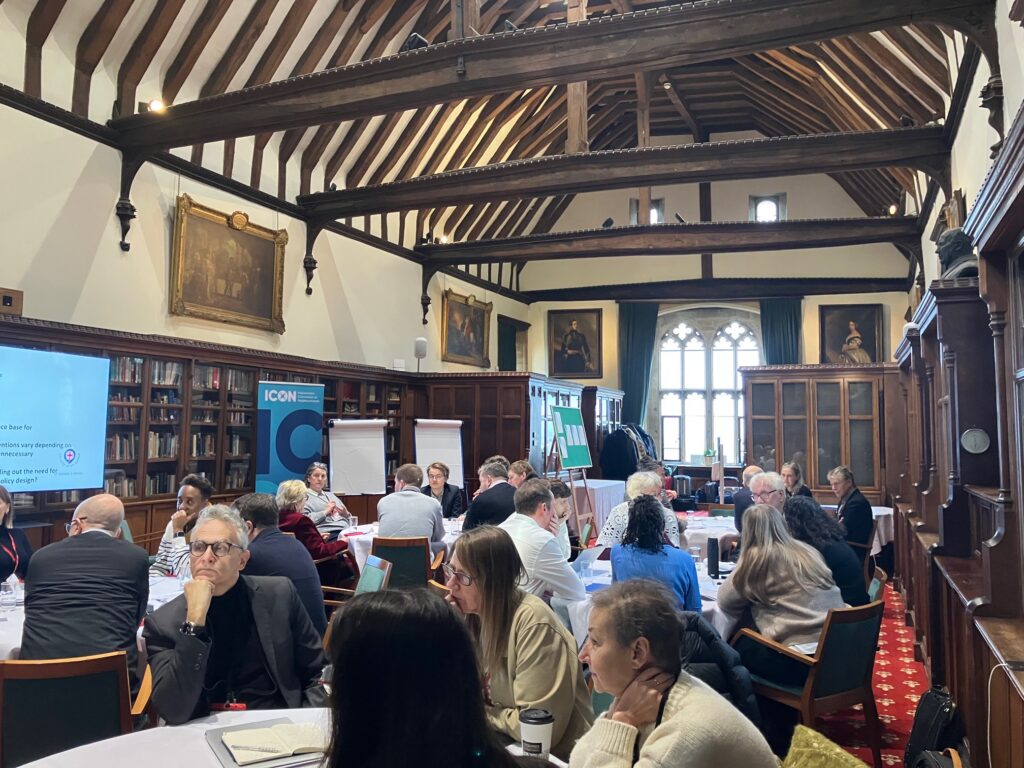Neighbourhoods have a powerful effect on the lives and opportunities of their residents, and while challenges are most acutely felt at the local level, the engine for solutions lie within communities.
As part of its evidence gathering, the Independent Commission on Neighbourhoods (ICON) convened a two-day consultation at St. George’s House, Windsor, bringing together a diverse group of stakeholders to explore the future of neighbourhood policy in England. Participants included representatives from the Ministry of Housing, Communities and Local Government (MHCLG), local authorities, voluntary organisations, academia, and neighbourhood leaders.
Through multiple sessions, the consultation covered discussion on the history of neighbourhood policy in England since the 1990s, the possible role of devolution for a future agenda, the challenges of evaluating neighbourhood level interventions both at the national and international interventions, and the need to create the right narrative for our strategy to be well-received both at the government level and by local communities. This event provided a platform for open and constructive dialogue on the current state of neighbourhoods in England, the policy environment necessary for their transformation, and how best to improve economic and social outcomes for the most deprived local areas, where clusters of multiple needs tend to concentrate.
The Current State of Neighbourhood Policy in England
Neighbourhood regeneration in England has a long history, with evidence from the past 25 years demonstrating that targeted interventions can significantly improve outcomes in areas such as crime reduction, health indicators, and community cohesion. However, the effectiveness of these policies is often undermined by shifting political priorities and insufficient long-term planning, and fragmented funding structures. A second issue is the challenge of evaluating success. Most place-based interventions are evaluated in terms of economic growth. Yet, as highlighted in discussions with civil society and those with first-hand experience in their local communities, true regeneration extends beyond the physical and economic improvements in an area and must comprise rebuilding trust, strengthening social connections, and fostering community empowerment.
Investment in physical infrastructure and core services must be matched with investment in social and human capital if the objective is to create neighbourhoods where people live well. Without a holistic framework for neighbourhood regeneration, challenges at the local level are likely to persist.
This means that policymakers need to recognise that, as neighbourhoods face multiple complex needs, requiring a cross-departmental approach that accounts for their interconnection
At the same time, they require deep and lasting relationships to be forged, with power widely dispersed and services designed to support and harness the strengths of every individual.
Places like community organisations, that reinforce the social infrastructure fabric of a place and are rooted neighbourhoods, are particularly well suited to this task. While they have been shown to generate significant economic returns at the neighbourhood level, their most essential contribution lies in unlocking the reservoir of local knowledge and skills, already present in local communities, as well as in creating places that bring people together, fostering support networks. Investing in social capital in deprived areas and empowering residents to become active change-makers have the power to create a ripple effect to address the multiple issues a locality faces at their roots.
Ingredients to success
While the attendees shared a broad agreement that successful neighbourhood interventions cannot be ‘one size fits all’ a few principles emerged as essential ingredients for a successful strategy. Effective neighbourhood policies require clear management structures and policy frameworks that provide consistency over time. Evaluations on past national and international interventions also suggest that investing in capacity building is essential to ensure that local leaders and organisations have the skills and resources they need.
The new government’s interest in devolution presents a valuable opportunity to enable local communities to engage in decision-making, ensuring that local residents play an active role in shaping policies that directly affect their lives. For it to be effective, the government should pursue a form of double devolution as mentioned in the White Paper, in which regional-level initiatives are complemented with power devolution at the neighbourhood level that empower residents and community organisations.
However, devolution must not mean shifting all responsibilities to the hyper-local level without adequate support. Neighbourhoods need backing from both higher levels of governance and the private sector. The private sector, in addition, must align its objectives with community needs, rather than focusing solely on profit. Sustainable models of investment that prioritise social impact alongside financial returns are essential for long-term success.
Conclusion
Neighbourhood regeneration in England stands at a crossroads. There is strong evidence supporting the effectiveness of well-designed interventions, but to drive meaningful change, the government must commit to a bold and clear neighbourhood policy agenda. The ICON consultation highlighted the urgency of shifting towards a more holistic, long-term approach that involve the engagement of residents in setting community priorities, and that recognises the value of social infrastructure and cohesion within local communities.
The discussions at St. George’s House were a clear demonstration of to the power of collaboration bringing together individuals with diverse expertise and a shared commitment to improving neighbourhoods. The consultation produced important recommendations for more effective, inclusive, and sustainable policies at the neighbourhood level.
However, these conversations are just the inception of our upcoming work. As ICON takes its work forward, engagement with stakeholders and local people themselves will be crucial to ensuring that our work is in line with the needs of those neighbourhoods that we are trying to help.
Author: Carola Signori, carola.signori@localtrust.org.uk
